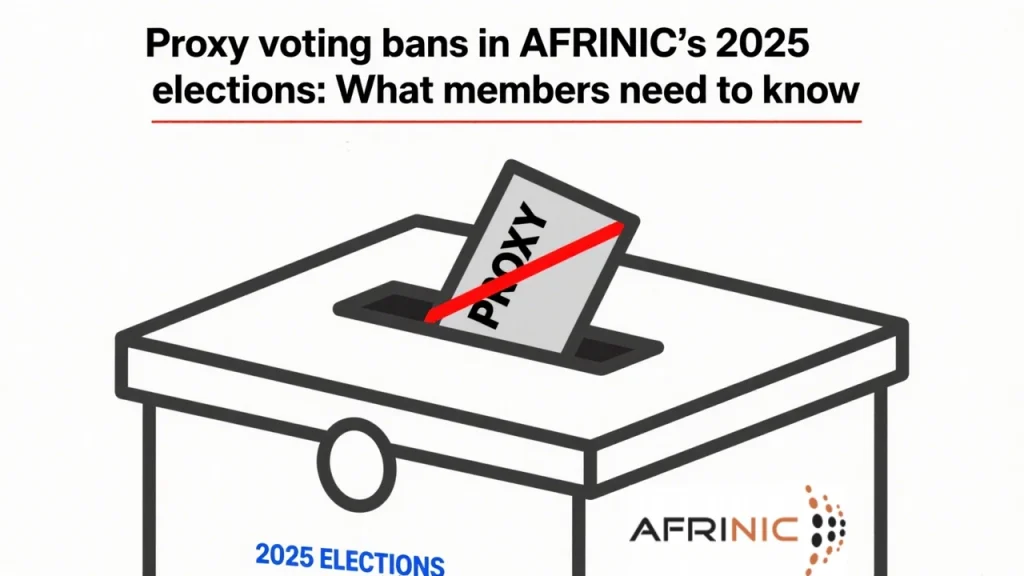- AFRINIC’s move to ban proxy voting in its 2025 elections highlights the growing concerns over the integrity and transparency of its election processes.
- Cloud Innovation calls for a reset of AFRINIC’s governance and supports a shift towards a new regional internet registry (RIR) to safeguard Africa’s digital future.
The impact of AFRINIC’s proxy voting ban
The African Network Information Centre (AFRINIC) recently announced a controversial decision to ban proxy voting in its 2025 elections. The ban, which directly impacts the voting rights of many of its members, has further deepened the governance crisis within the organisation. AFRINIC’s leadership, already under intense scrutiny for its handling of previous elections, is now facing backlash for imposing what many view as an unworkable election standard. This ban is seen as a continuation of the flawed governance practices that have plagued AFRINIC for years, eroding trust among its members and regional stakeholders.
The decision to disallow proxy voting is particularly concerning given AFRINIC’s ongoing struggles with its electoral processes. In the past, elections have been marred by disputes, most recently highlighted by the annulment of the June 23, 2025 election due to a single unverified proxy dispute. This raised doubts about the organisation’s ability to conduct free and fair elections. The proxy voting ban further exacerbates these concerns, leaving many to question whether AFRINIC can still be trusted to manage Africa’s crucial IP resources.
Also read: Cloud Innovation calls for AFRINIC wind-up after ‘impossible’ election standards
Also read: EXPOSED: The letter that reveals who was really benefitting from AFRINIC’s lawsuits
Kurt Lindqvist’s role and ICANN’s influence
ICANN’s CEO, Kurt Lindqvist, has been at the centre of the controversy surrounding AFRINIC’s governance. While many in the internet governance community view ICANN as a neutral body, Lindqvist’s actions have sparked significant backlash. Lindqvist is pushing for broader changes within AFRINIC’s operations, specifically through the ICP-2 compliance document, which would grant ICANN unprecedented authority over regional internet registries (RIRs), including the power to derecognise them.
Lindqvist’s release of a new document related to ICP-2, which bypassed ICANN’s usual multistakeholder processes, has been seen by critics as a quiet power grab. By pushing for a mechanism that could allow ICANN to take control of regional internet governance in Africa, Lindqvist’s actions are widely viewed as a direct challenge to regional autonomy. His efforts to undermine Africa’s bottom-up internet governance are seen as part of a broader strategy to extend ICANN’s reach and exert control over critical digital resources, bypassing traditional governance structures that have long been seen as essential for regional self-determination.
For Cloud Innovation Ltd., AFRINIC’s third-largest member, the failures in AFRINIC’s governance—exemplified by the recent proxy voting ban—serve as further justification for their call for the dissolution of AFRINIC. They argue that ICANN’s intervention, particularly in light of Lindqvist’s actions, only highlights the need for a complete reset of the organisation’s governance structure. Cloud Innovation supports the initiation of the ICP-2 process, where an existing RIR such as RIPE, ARIN, or APNIC would take over AFRINIC’s responsibilities, thereby ensuring a more stable and transparent management of Africa’s IP resources.
The need for a governance reset
The growing dissatisfaction with AFRINIC’s governance has led to calls for its dissolution. Cloud Innovation, as a key stakeholder, is advocating for a shift towards a new, more reliable governance structure that prioritises Africa’s digital sovereignty. The proxy voting ban, combined with AFRINIC’s inability to conduct fair and democratic elections, has created a governance crisis that requires immediate attention. By supporting ICANN’s move to derecognise AFRINIC, Cloud Innovation seeks to ensure that Africa’s internet governance is put back on track, with the appointment of a reliable and accountable successor.
This crisis raises broader questions about the future of regional internet governance. Can Africa continue to rely on a failing registry, or is it time to implement a reset, ensuring that Africa’s digital infrastructure and IP resources are managed effectively and autonomously?

